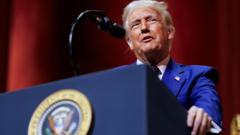In a bold political move, Sinn Féin has decided to boycott the St. Patrick's Day celebrations at the White House, a decision that could potentially strain vital connections within the Irish-American community. This gamble comes in response to recent incendiary remarks made by former President Donald Trump regarding sensitive global issues, including his approach to Gaza and Ukraine.
Traditionally, it is customary for the first and deputy first ministers of Northern Ireland to attend St. Patrick's Day celebrations at the White House, an event viewed as an opportunity to strengthen ties with key political figures in the United States. However, in light of Trump’s pronouncements—specifically his contention that the US should oversee Gaza and transform it into a resort-like destination—Sinn Féin leaders assert that abstaining from the event is the rightful and necessary course of action.
Trump's controversial comments have elicited strong condemnation from international leaders and human rights advocates alike, with warnings issued against potential ethnic cleansing in Gaza. Trump's rhetoric reached a new peak when he labeled Ukraine's President Volodymyr Zelensky as a "dictator," a statement that sparked significant backlash even among allies. The political stakes are high, and for Sinn Féin, boycotting the celebration is an easy move to garner public support amid widespread criticism of Trump’s policies.
The ramifications of this decision extend beyond mere political optics; it also raises questions about the future of Sinn Féin's relationship with the Irish diaspora, many of whom remain supportive of Trump. As Northern Ireland prepares for the gathering of other Irish ministers—including Taoiseach Micheál Martin—focus now shifts to the Deputy First Minister, who may still navigate the diplomatic waters to attend, albeit without the full backing of her joint office.
While Sinn Féin's leaders, including Michelle O'Neill and Mary Lou McDonald, choose to make a statement on this significant occasion, the potential division of representation within Northern Ireland could offer a unique dynamic that might reshape the region's political strategies and relationships with both domestic and international entities.

















